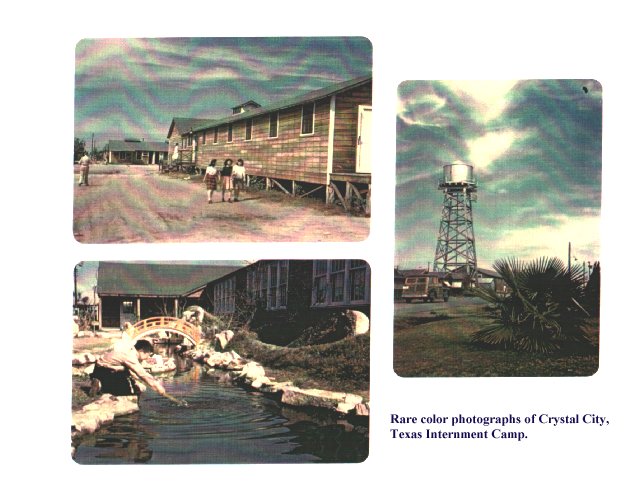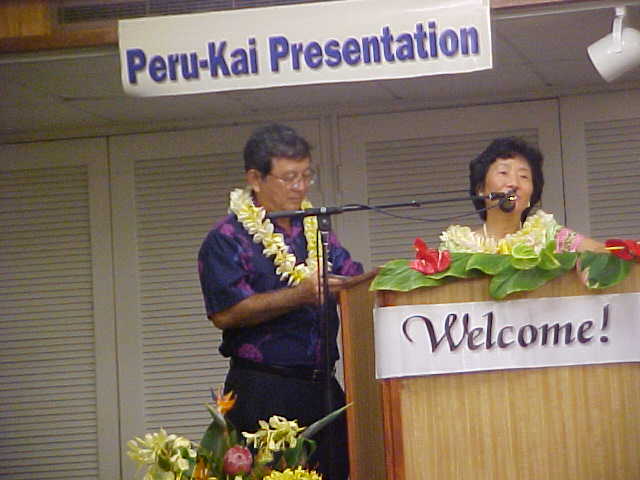
What is the JPOHP?

The Japanese Peruvian Oral History Project (JPOHP) was formed in 1991 by former Japanese Peruvian internees and their families to preserve the remembrances of those who were forcibly taken from Peru and interned in concentration camps in Panama and the United States during World War II. By documenting these family oral histories, we strive to deepen our understanding of the rich texture of our past -- with the hope that such violations of civil and human rights not be repeated by any government during times of peace or war.
The Project goals are:
* to collect and conduct oral histories,
* to educate ourselves and others about the Japanese Peruvian experience during World War II
* to promote dialogue and interaction among Japanese Peruvians and the broader society in the U.S., Peru and Japan, and
* to provide information and referral for former Japanese Latin American internees and their families seeking redress.
Please join us in preserving this part of our history.
If you would like to share any comments or suggestions or would like to know more about our Project, please contact us at the National Japanese American Historical Society (NJAHS); at the address below.
We would welcome financial contributions (which are tax deductible) very much! Please make your check payable to JPOHPINJAHS and send it to:
Japanese Peruvian Oral History Project (JPOHP)
P.O. Box 1384, El Cerrito, CA 94530
Phone/Fax: (510) 528-7288
e-mail: jpohp@prodigy.net

The Little-known Story ot the
Japanese Peruvians During WWII
As people become more aware of the WWII internment of Japanese Americans, it is still a surprise for many to learn that persons of Japanese ancestry were forcibly deported from their homes in Latin America and incarcerated in internment camps in the United States for the purpose of hostage exchange. Not only did the U.S. government violate the civil rights of its own citizens, but it also went outside its borders and violated the human rights of civilians in Latin America.
From December, 1941 to 1945, the U.S. government orchestrated the forcible deportation of 2,264 men, women and children of Japanese ancestry from 13 Latin American countries to be used as hostages in exchange for Americans held by Japan. Of these, about 1,800 (80%) were Japanese Peruvians.
The U.S. government financed their transportation over international borders and their incarceration in U.S. Department of Justice internment camps. It justified its control over the Japanese Latin Americans by confiscating their passports upon entry to the country and labeling them as "illegal aliens". Most of the JLAs were interned in a former migrant labor camp at Crystal City, Texas. This facility also held persons of Italian and German ancestry from the United States and Latin America as well as Japanese Americans.
Over 500 Japanese Peruvians were included in the two prisoner-of-war exchanges, which took place in 1942 and 1943. This left about 1,400 Japanese Latin Americans who continued to be interned in the U.S. Their ordeal did not end with the close of WWII in 1945. The remaining Japanese Latin Americans were told that they were "illegal aliens" and would be deported from the U.S. At first, the Peruvian government refused to readmit any Japanese Peruvians, even those who were Peruvian citizens or married to Peruvian citizens. As a result, between November 1945 and June 1946, over 900 Japanese Peruvians were deported to war-devastated Japan. 300 Japanese Peruvians remained in the U.S. and fought deportation through the courts. Eventually about 100 Japanese Peruvians were able to return to Peru. It was not until June 1952 that the Japanese Peruvians who stayed in the U.S. were allowed to begin the process of becoming U.S. permanent residents. Many later became American citizens.
This violation of civil and human rights was not justified by a security threat. Rather it was the outcome of historic racism, anti-foreign prejudice, economic competition and political opportunism during time of wan The U.S. government has yet to acknowledge this wrongdoing against the Japanese Latin Americans.
For more in formation:
Please contact the Japanese Peruvian Oral History Project (JPOHP) for more information. If you would like to 'make a financial contribution (which is tax-deductible), we would welcome it very much! Please make your check payable to JPOHPINJAHS and send it to:
Japanese Peruvian Oral History Project (JPOHP)
P.O. Box 1384, El Cerrito, CA 94530
Phone/Fax: (510) 528-7288
e-mail: jpohp@prodigy.net
These materials are made possible under fiscal sponsorship of the National Japanese American Historical Society and assisted financially by the Civil Liberties Public Education Fund.
WHY SHOULD YOU KNOW ABOUT
THE INTERNMENT & REDRESS EXPERIENCE OF JAPANESE
LA T'N AMERICANS DURING WYVILsa
It is a part of WWlI and US history
* It is still not widely known that the US government orchestrated the forcible deportation of persons of Japanese ancestry from Latin America and interned them in the US for the purpose of prisoner of war exchange.
* When studying WwIl, the usual focus has been on Europe and Asia. It is important to include how Latin America was affected by Wwll, especially as many of our students are of Latin American heritage.
It is a part of Japanese American history
* This episode illustrates a unique immigrant experience of part of the Japanese American community -- being "kidnapped" and interned by the US government.
* Japanese Latin Americans underwent similar experiences with other Americans who were incarcerated in the Department of Justice internment camps, exchanged during the war and who resettled after the war (being deported to remaining in the US and often integrating into the Japanese American community).
Japanese who were Japan or
It highlights the antiuimmigrant aspect of the relocation and internment experience in the US
* The constitutional and human rights of US citizens and permanent residents as well as immigrants of Japanese ancestry were violated. The anti-immigrant aspect of relocation and internment becomes more apparent with the treatment of the non-citizen Japanese Latin Americans and the permanent resident Isse in the US (who were prevented by law from becoming citizens, accused of being "enemy aliens" and among the first apprehended and interned in the Department of Justice camps).
* An important lesson is how anti-immigrant prejudice and racism were exploited and led to legislative restrictions and civil and human rights violations.
It promotes civic responsibility among students
* The redress struggle of Japanese Americans and Japanese Latin Americans is a lesson in the importance of holding governments accountable for their wrongdoing.
* The aftermath of the internment experiences is still unfolding. The struggle for historical accuracy, public apology, full disclosure, and redress from the WwlI era is still a dynamic ongoing process --taking place within the US and globally. The Japanese American community has an important role to play in this struggle for justice.